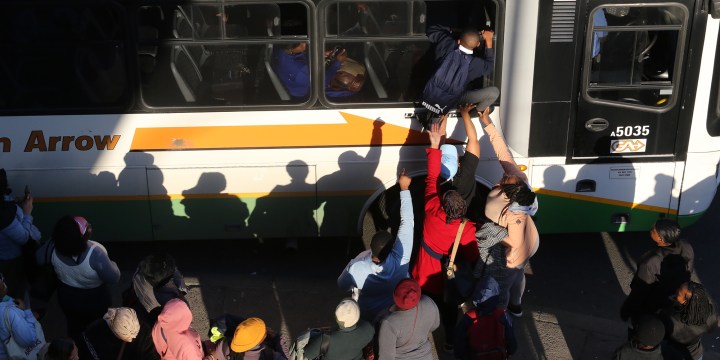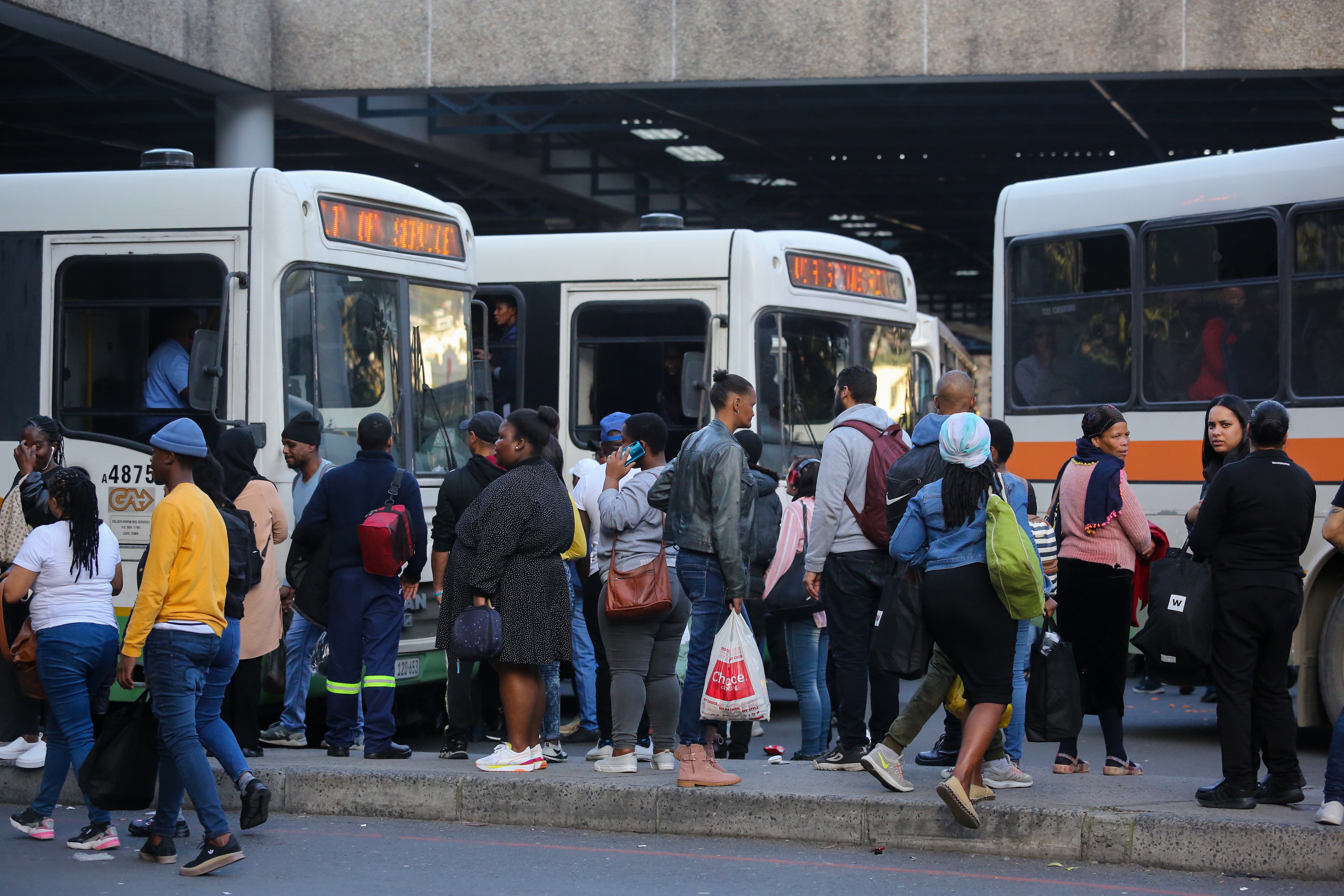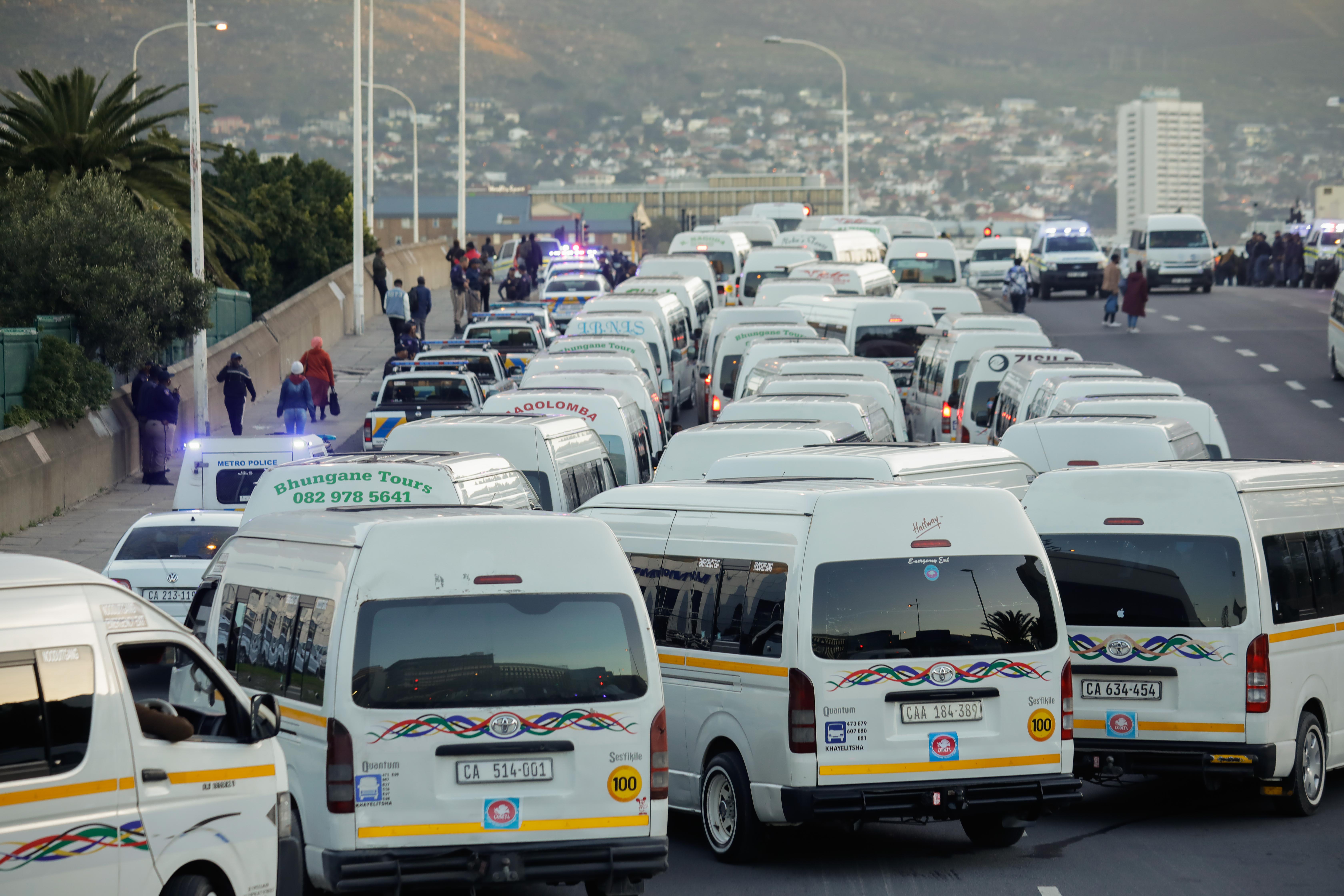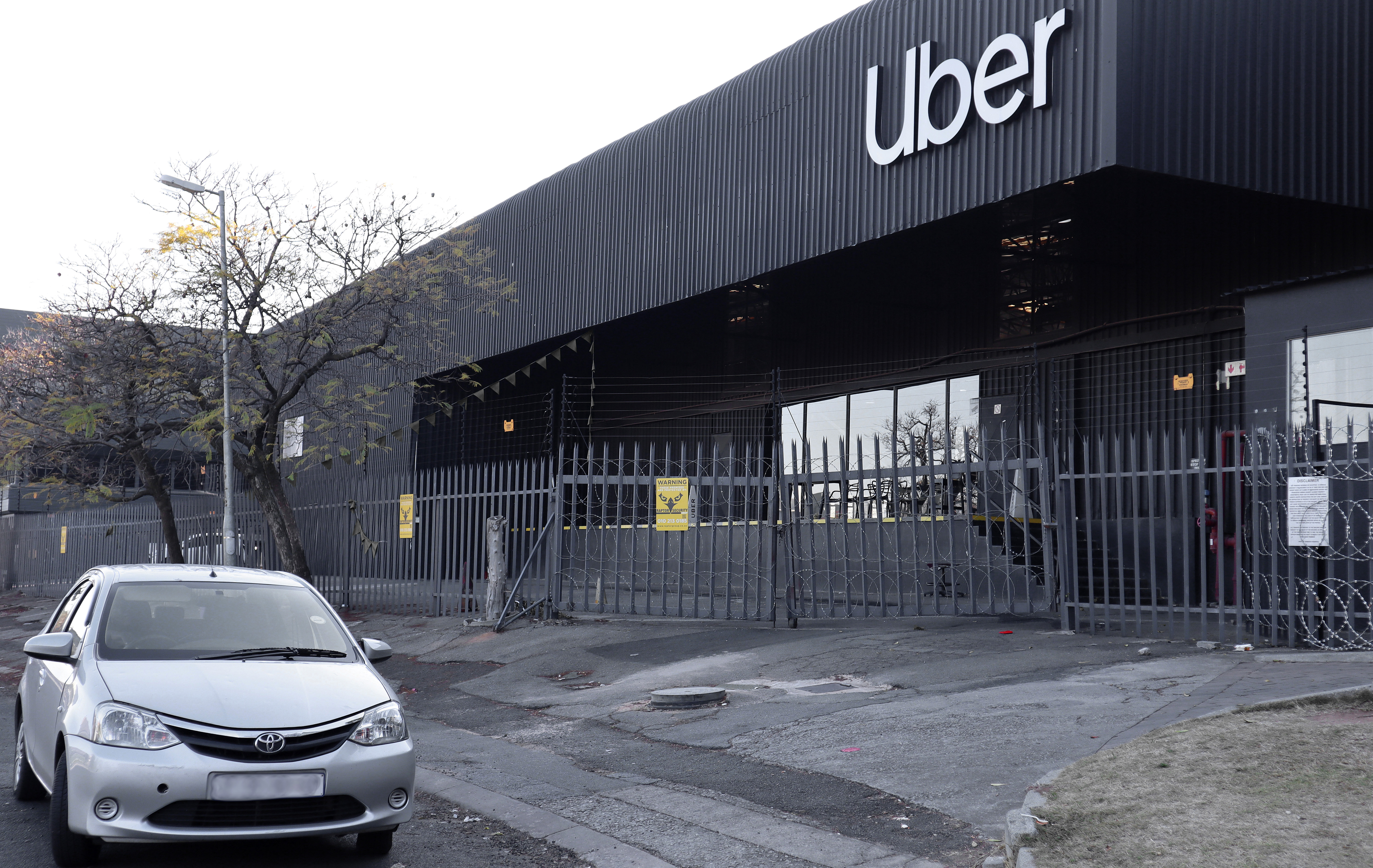TRANSPORT STRIKE
Forget about swiping for Uber or Bolt — e-hailing services have joined Cape Town’s taxi strike action

As politicians bicker over who attended which meetings with now-striking taxi associations, commuter frustrations are increasing as e-hailing services join the strike action.
The Western Cape E-hailing Association (WCEA) has joined the ongoing taxi strike. The association represents drivers from different e-hailing services, namely Uber, In-Driver and Bolt, to mention a few.
The association was in attendance at the taxi association meeting held in Makhaza, Cape Town, on Thursday 3 August. But when called to vote on whether to strike or not, no one stood up.
Drivers for e-hailing services are often at the receiving end of violence meted out on them by other taxi operators, who see them as competition.
But on Friday, in a statement, WCEA said they fully support the resolution that was adopted at the meeting, and that they participated in the process through the attendance of their delegates, led by chairperson Siyabonga Hlabisa.
“In line with calls by our own members calling for more shift action to stop the current spate of impoundments, we deemed it necessary to support the call for the stay-away,” reads the statement.
Call for action
The association said the call for action was overwhelmingly supported by all regions in the Western Cape. “We do sympathise with all those who will be negatively impacted as a result of the stay-away, especially workers, students, and the elderly.
“Those who elect to dishonour the call for action must bear responsibility for their own decisions, should they decide to engage in normal transport business.”
E-hailing vehicles set alight
E-hailing services were operating on Thursday until evening, as one of the few options available to commuters left stranded by the immediate start of the strike. A number of vehicles that were said to belong to their drivers, were set alight in Langa.
Read more in Daily Maverick: Day 2 of Western Cape taxi strike begins with shot bus driver, burning tyres, fresh scramble to get to work
The association also used the strike to register their grievances, saying they demand an unconditional moratorium on all further impoundments, and urge the national government to intervene to help stop the “tyranny and kragdadigheid of the DA government in the Western Cape”.
“We further call on the DA, City of Cape Town/PRE to level the playing field in the e-hailing sector by withdrawing the regulatory provisions that force us to have taxi metres installed as a requirement to the upliftment of Operating Licences. This provision is clearly an attack on the already declining living conditions and poor income of drivers in the e-hailing sector, and is only geared toward filling the financial coffers of the City of Cape Town”.
Meanwhile, Police Minister Bheki Cele defended his meeting with striking taxi associations a few hours before the announcement of the taxi strike, which quickly turned violent on Thursday.
Cele was seen by Daily Maverick outside the venue in Makhaza, where eight taxi regional associations under the South African National Taxi Council (Santaco) met and resolved to go on strike immediately.
While Cele did not speak at the meeting, Daily Maverick can confirm that he met with the top leadership of Santaco just before the meeting.
The minister was in Cape Town to launch Operation Shanela, an initiative launched on 8 May 2023, to fight crime with high-density policing measures.
He also attended the sod-turning ceremony to make the start of the construction of Makhaza Police Station.
Actions questioned
Mayor Geordin Hill-Lewis questioned why Cele had attended Santaco’s meeting.
“I am concerned that this (Thursday) afternoon’s violence follows Police Minister Bheki Cele’s involvement in industry strike action talks, despite not being constitutionally responsible for transport. That a minister in government responsible for policing could convene a meeting with the taxi industry that results in a strike call, knowing full well this will lead to violence, is unacceptable,” Hill-Lewis said.
DA Member of Parliament Andrew Whitfield also raised his concern, saying the primary responsibility of the police minister is to maintain law and order and ensure the safety of all citizens, regardless of the circumstances.
“It is distressing that while the strike was underway and acts of violence were being perpetrated, Minister Cele was not seen addressing these incidents,” said Whitfield.
“The burning of buses and looting of trucks have put innocent lives at risk, and the recent shooting of a bus driver in Khayelitsha is a tragic incident that should not be overlooked.”
He said Cele should have taken immediate action to mitigate the violence that erupted during the strike.
Cele responds to queries
Defending his meeting, Cele said he met with the leaders of Santaco to try to persuade them not to continue with the strike.
“There are three most interesting issues that we needed to protect: One is that there is a World Cup there, secondly, as SAPS we are drawing out of our main function to go and deal with the situation. Thirdly, there will be activities come August ninth, so if there is no transport, matters might be difficult for those people including the President.”
Santaco’s strike will end on 9 August, the day President Cyril Ramaphosa will be in Khayelitsha to deliver a keynote Women’s Day address.
Cele said he was made aware of JP Smith’s comments that he [Cele] encouraged the taxi drivers to go on strike.
“I think the guy needs serious physiological help. I sat with him on the stage together with the MEC (of Mobility) and said we need to resolve this. My pained heart goes to the people of Langa, Gugulethu and Khayelitsha, who are trying to help commuters have their vehicles attacked. We are making the call to allow people to live their lives, and the associations, together with the Western Cape government, to resolve the matter.”

People gather at the Golden Arrow Bus Station trying to get home as taxis started striking on Thursday 3 August 2023. (Photo: Shelley Christians)
Call to halt the strike
Meanwhile, the Minister of Transport Sindisiwe Chikunga, who is in Cape Town for the national dialogue on coalition governments, has called on Santaco to halt the strike and to meet with her, together with the provincial and local government.
Read more in Daily Maverick: Taxi industry and City of Cape Town harden their stances amid strike violence and mayhem
“We have requested the MEC for Transport (in the Western Cape) because we believe the Department of Transport should lead, and not the police, because this is a matter that requires the Department of Transport nationally and provincially, sitting together with the Metro.
“Of course, also the taxi industry itself is represented by Santaco. We have invited the national leadership of Santaco, also their provincial and local leadership, so that we hear exactly what the issues are and find solutions to those problems,” Chikunga said.
Very frustrated commuters
But while politicians bicker, commuters suffer.
A woman who only wanted to be known by her first name “Judy”, who lives in Khayelitsha, expressed her frustration at the decision to impound taxis.
“They impound our transport and leave us, even leaving behind our kids. This is a betrayal of the rights of children.”
She described how a handful of her co-workers who chose to walk home are now regretting their decision, saying some got robbed on their way.
“Taxis constantly use us as props to incite the government and that invariably results in us being the ones on the receiving end of the entire issue,” Judy said.
Read more in Daily Maverick: Chaos, arson and threats of legal action after Cape taxi drivers begin strike
We had our strike
Uber drivers who spoke to Daily Maverick, questioned the impact on the wider community.
Mohamed Yusuf said the previous Uber driver protest on 17 July successfully drew attention to safety concerns, without disrupting the city’s transportation network.

Taxis around the CBD on August 01, 2023 in Cape Town, South Africa. According to media reports, taxi drivers and law enforcement officials clashed after several minibuses were impounded around the CBD. The City said taxi drivers assaulted a traffic officer and also blockaded the exit route to the rank. (Photo by Gallo Images/ER Lombard)
According to Yusuf, more than 6,000 Uber drivers from Cape Town, Durban and Joburg were united by temporarily ceasing operations, effectively conveying their concerns and prompting necessary changes.
In contrast, the ongoing taxi strike has taken an indiscriminate toll on innocent commuters and local businesses.
“We had a one-day protest in July, where we requested over 6,000 Uber drivers to withdraw from operating over safety concerns, and our cries were heard and everything was sorted and now everything is fine. Why should the taxi strike affect everyone?” he asked. DM




















 Become an Insider
Become an Insider
I will no longer use e-hailing services as of this moment. I do not support criminals.
Uber and Bolt, I expect that you support the rule of law in our country by firing drivers who refuse to operate in support of law breakers.
And so the political madness begins….
If these thugs win the day, it is another sign of ‘game over’ for South Africa. It’s a standing joke that taxis do crazy stuff, everywhere, every day. Why should they be above – beyond – the law? Cele is a joke. A dangerous joke.
I will no longer use e-hailing services as of this moment. I do not support criminals. Uber and Bolt, I expect that you support the rule of law in our country by firing drivers who refuse to operate in support of law breakers.
You clearly have no idea how e-hailing services work. Uber and Bolt drivers are not employees, but free agents. Contractors, so to speak. Perhaps they are ‘brand ambassadors’…..
Clearly a case of Uber keeping their drivers out of the firing line. Even in “normal” times, just chat to an Uber driver and hear about the abuse they get from the taxi cockroach gangsters. Keep up the pressure JPS; the law abiding citizens of Cape Town are with you.
+1
One must sleep in the bed one makes.
One has to applaud the CoCT’s willingness to step into the firing line and take the taxi industry head on. Their disregard for the law, safety of other road users and passengers need not be elaborated on – most of us know it from experience. It’s high time these de-facto mafia’s are treated the same as all other citizens. However, the CoCT has really botched the timing of this – impounding taxis could have happened with proper consultation and forewarning, and after the global sport event in the city. Commuters would have had time to anticipate the strike and not be left high and dry (which now reflects badly on the DA). It’s of course the taxi associations who also jumped into the strike without proper forewarning and are ultimately to blame for the commuters’ predicament, but their actions were to be expected. This didn’t have to be such a debacle.
unfortunately, about ¾ of workers commute via minibus. If the taxi organisations could keep their strike/protest peaceful, they would be powerful. Like this, most people just view them as thugs.
The city is going to have to alter the impound campaign. It is doubtful they have the legal right to impound John’s car because Peter drove it through a red light, or that impounding a vehicle for months until trial is a suitable response to a broken indicator. Now, it’s also emerged that this campaign under bylaws secures revenue for the city, whereas fines under national rules will go to national RTIA. According to Smith:
“ What it does do is it takes a share of the revenue of the City. So, it will take a chunk of money out of the City’s pocket“
and
“We will, therefore, give preference to bylaw enforcement through the criminal justice system and then use the Aarto system for certain offences, like, for instance, speeding.”
Those statements severely harm the perception of why CPT is on this impound mission – safety does not seem to be their motivation?
Cele’s comment ” My pained heart goes to the people of Langa, Gugulethu and Khayelitsha, who are trying to help commuters have their vehicles attacked. ”
I read this three times and still cant work out what this means, what Cele is trying to express, or what point he is trying to make. Can anyone help me?
Please all motorists be careful – not just public transport commuters affected, but also those with their own means of getting around, being targeted too. I was attacked yesterday (Thursday) afternoon in the Montague Gardens area while driving – massive stones and bricks thrown at my car windscreen and windows. Anti-hijack tinting held up, but very very lucky I managed to get away, others not so lucky – some having their possessions taken and their cars torched on the spot.
Spitting and swearing at the drivers and invoking the criminal law against them is not the answer. I am sure that the majority of them would prefer to be safe and lawful drivers. The entire structure of passenger transport needs to be understood, and this includes the bus services and rail services. Parliament should be recalled immediately, and a full enquiry established to understand what the problems are. This is a very dangerous situation and unless it is resolved quickly it may become the worst crisis South Africa has faced. This is a moment to be very afraid. Invoking the criminal justice system against the drivers is the worst possible first response. What are the pressures on them that force them to drive the way that they do? What part do their employers and the owners of the taxis play?
Mbennum: from another article it would appear that CPT is using criminal Justice systems because that allocates the fines revenue to CPT not National. This is beyond moronic as a tactic…